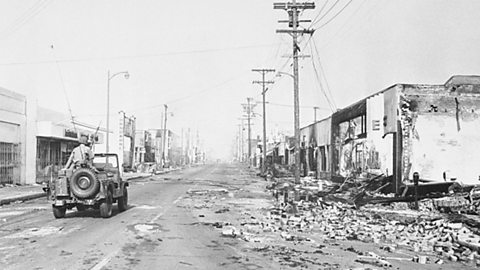Black Power
Black PowerA movement in support of rights and political power for black people. was a phrase used to describe the idea that black Americans should be more direct and forceful in dealing with the violence, discriminationTo treat someone differently or unfairly because they belong to a particular group. and poverty that they faced. Even after the 1964 Civil Rights Act and 1965 Voting Rights ActPassed by President Lyndon B Johnson to end methods used to restrict citizens from voting, such as literacy tests. segregationThis meant that white people and black people had to live separately. The areas of society affected by segregation included churches, hospitals, theatres and schools. and discrimination continued. Neither of these laws did anything to improve the poor living conditions of many black Americans. Nor did they lead to increased job opportunities for black Americans, especially in the cities in the northern states.
Race riots
One way that black Americans showed their frustration with the continuing discrimination was through race riots. Tens of thousands of people rioted in Watts, California, in 1965 and a large number of people rioted in Newark, New Jersey, in 1967. There were also widespread race riots across the USA following the assassination of Dr Martin Luther King Jnr in 1968.
The riots resulted in hundreds of deaths, thousands of serious injuries and hundreds of millions of dollarsâ worth of damage. In response, President Lyndon B Johnson ordered an investigation that led to the Kerner Report, written by the governorA person who is elected to lead a stateâs government in the USA. of Illinois, Otto Kerner, in 1968. Kerner concluded that the riots had been caused by racism in society and the use of violence by the police. He stated that there had become two USAs, one black and one white.

Stokely Carmichael and Black Power
One of the leaders of the Black Power movement in the 1960s was Stokely Carmichael. At the beginning of the 1960s, Carmichael had been a member of the Student Nonviolent Coordinating CommitteeSNCCStudent Nonviolent Coordinating Committee initially promoted non-violent protest. which had organised sit-inWhen protesters sit inside or outside a business to protest against its rules. marches, boycottTo refuse to take part in, buy or use something in order to show disapproval or bring about a change. and voter registration campaigns. However, he became increasingly angry at the violence and intimidation that campaigners faced from the police. He argued that black Americans should be solving problems for themselves without needing the help of white people. This was what he saw as Black Power.
Inspired by Malcolm X, Carmichael encouraged black Americans to be proud of who they were and to celebrate their African heritage. Eventually he left the SNCC, became involved with the Black PanthersAn African American organisation founded in 1966 that aimed to protect black communities from racist violence and help people within the community to live better lives changed his name and went to live in Africa.
Impact of the Black Power movement
The Black Power movement had a wide range of impacts. Some can be seen as positive and some negative.
Some positive impacts included:
- The Black Power movement persuaded some civil rightsRights everyone is entitled to regardless of the colour of their skin, their beliefs, sexuality, gender or other personal characteristics. These rights could include the right to vote, or the right to a good education etc. organisations, such as the Southern Christian Leadership ConferenceSCLCSouthern Christian Leadership Conference. A civil rights organisation set up in 1957 based on Christian values that peacefully campaigned against segregation in the USA. to turn their focus away from passing laws and more towards improving the living conditions and economic circumstances of black Americans.
- The Black Power movement persuaded President Johnson that more had to be done to help black Americans, especially in terms of education. Johnson supported busing, which meant using buses to take students from the black American parts of a town to schools in the white American parts.
- Johnson built on President Kennedyâs policy of affirmative action by issuing a presidential executive orderAn order signed by the US president directing government departments to do certain things. Executive orders do not require approval from Congress. on the topic in 1965. Affirmative action involves putting in place policies and practices which were designed to increase opportunities for historically underrepresented groups. At this time, this involved the encouraging employers and colleges to give opportunities to as many black Americans as they could.
Some negative impacts included:
- Law enforcement authorities used the forceful nature of the Black Power movement as an excuse to treat all African American activists with hostility.
- Many white Americans and politicians were alienateTo make someone feel isolated from others. by the movementâs ideas and approach. They did not want to ârewardâ any violence.
More guides on this topic
- Anti-Communism c.1945-1954 - OCR A
- African Americans c.1945-1954 - OCR A
- Civil rights in the USA 1954-1964 - OCR A
- Broadening of the campaigns for civil rights - Women's rights - OCR A
- Broadening of the campaigns for civil rights - Gay rights - OCR A
- Politics and protest - OCR A
- Social problems and attempts to tackle them - OCR A